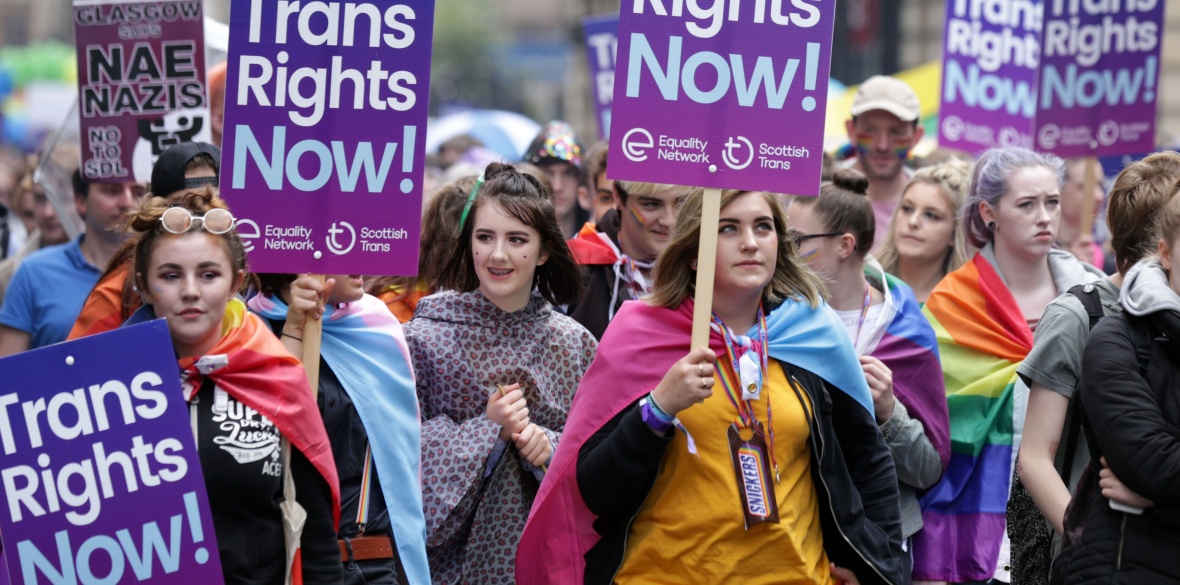This is the last article you can read this month
You can read more article this month
You can read more articles this month
Sorry your limit is up for this month
Reset on:
Please help support the Morning Star by subscribing here
WHEN the government announced a consultation on changes to the Gender Recognition Act in July last year, trans people expected that by now we might be discussing the outcome.
However, proposals to streamline and demedicalise the process to change our legal gender proved more controversial than the government perhaps anticipated. Repeated delays left a vacuum that spawned polarised and often heated discussions on social media and elsewhere.
Thankfully that wait finally came to an end on Tuesday. But while the government dithered, trade unions have not flinched in their support of trans workers. The TUC LGBT+ Conference, opening today at Congress House, promises a rich debate on the issues that concern trans people. Alongside the legal recognition of trans and non-binary identities, the agenda covers NHS gender services, the promotion of good mental health and the need to take firm action against hate crime, harassment, discrimination and bullying.
In a society where those inflamed internet discussions have led to violent exchanges on the streets, it is even more important for trade unionists to come together and discuss both policy and practice around legal gender recognition. Workplace policies need to be respected and understood if they are to be effective, and that requires the engagement of the entire workforce. LGBT+ organisations have a vital role to play in that campaign but trade unions are in the heart of the workplace. As trade unionists, we have the relationships and the organisation to drive out fear and suspicion and bring some light and understanding to the debate.
Trade unions also have the benefit of a wider perspective that can enrich a campaign. The recent awakening of non-binary identities should be celebrated as we campaign with colleagues who identify as neither men nor women. While sexist codes on behaviour and gender expression have a specific impact on all gender non-conforming people, they restrict us all. For example, policies to support non-binary people could and should see the end of sexist dress codes that still expect women to wear heels and men to wear ties. Meanwhile we can all benefit from the option of safe and secure unisex provision. Good practice is good practice for all.
Under a government committed to austerity, access to healthcare is a widespread concern, but trans people seeking specialist services face particular hurdles. While the media has focussed on legal recognition, waiting times to be seen at gender identity clinics have increased further. Appallingly, the typical delay from referral to first appointment is currently 18 to 24 months. This is not that fault of clinicians; it is the responsibility of government which has failed to respond to increased demand that had been predicted years before. Meanwhile patients (no pun intended), whose lives are blighted by gender dysphoria, seek expensive private provision or DIY solutions involving hormones bought on the internet.
From personal experience, I know that the impact on mental health is enormous. After waiting almost two years for NHS treatment, I felt abandoned by the system and all too aware of the chronic underfunding of mental health services.
As a teacher working with young people, I also see the effect on children and adolescents at first hand. I was particularly alarmed by the findings in the 2017 Stonewall school report that showed that trans young people are at risk of self-harm as a result of persistent transphobia. NASUWT, my own union, is calling at conference for increased mental health awareness training in schools and colleges that specifically focusses on tackling homophobic, biphobic and transphobic bullying.
We are not alone in our concerns about the task that still needs to be done to overcome prejudice in society
In a survey of over 5,000 people last year, the TUC found that more than one in three LGBT people have been harassed or bullied at work. At the time general secretary Frances O’Grady said: “Britain is fast becoming a more equal and accepting country. But it’s shocking that so many lesbian, gay, bi and trans people around the UK still experience discrimination and harassment at work just because of their sexuality or because they are trans.”
The task is huge but the trade union movement is bigger. For 150 years the TUC has been changing the world of work for good. Trans people are at the heart of that movement not because we are trans but because we are trade union members. While government prevaricates, trade unions are taking action to inform the workforce, call out injustice and change society for the better.
Debbie Hayton is a national executive member of teachers’ union NASUWT and a member of the TUC LGBT+ Committee.










